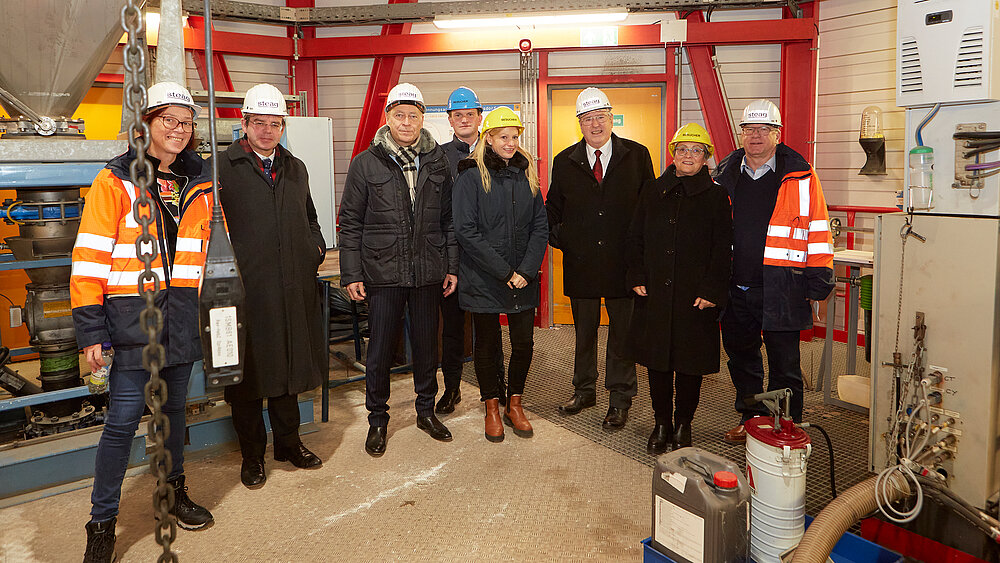Waste heat for Rüdersdorf?
Rüdersdorf/Essen. The Brandenburg Minister for Economic Affairs, Labor and Energy, Prof. Dr.-Ing. Jörg Steinbach, and the mayor of the municipality of Rüdersdorf near Berlin, Sabine Löser, met with Dr. Andreas Reichel, Chairman of the Management Board of STEAG GmbH, on Monday, December 19, 2022, at the IKW Rüdersdorf industrial power plant to discuss the issue of possible heat extraction for heat supply to the Rüdersdorf municipality.
IKW Rüdersdorf has been using commercial and municipal waste to generate electricity in the Märkisch-Oderland district since 2009. On an annual average, IKW Rüdersdorf produces a good 245 gigawatt hours of reduced emissions electricity from 245,000 metric tons of waste.
The electricity generated in Rüdersdorf is largely used directly by a neighboring cement plant: CEMEX Deutschland AG – one of the region’s longest-established and largest employers – can almost completely cover its electricity requirements from the IKW Rüdersdorf plant as a result. Any electricity not required is fed into the public grid.
Heat from cogeneration potentially available
“By extraction from the steam turbine, the plant is technically capable of providing up to 20 megawatts of heat,” says IKW plant manager Harald Lehmann, who heads a team of 45 employees and two trainees. In the future, this potential could be used to supply district heating to the community at Rüdersdorf.
After the abandonment of initial considerations on this subject several years ago, which could not be pursued for economic reasons, the state of Brandenburg, the municipality of Rüdersdorf and the Essen-based energy company STEAG, as owner and operator of the plant, once again got together to sound out the opportunities and potential.
Favorable outcome
The outcome of this exchange of ideas was viewed favorably by all those involved: “In these times of energy crisis, it is imperative to intensively examine all opportunities to reduce Germany’s dependence on energy imports,” says Brandenburg’s Minister of Economics, Jörg Steinbach. “This can also be a contribution to curbing the recent massive rise in energy prices.”
The mayor of Rüdersdorf, Sabine Löser, sums up the issue as follows: “As long as there are no viable alternatives to the present power generation for the cement plant, we should also examine whether heat can be obtained for a district heating pipeline and whether this can be integrated into a municipal heating plan. The existing potential should then be exploited using the best and lowest emission technology available, but without burning more waste on site than necessary.”
For STEAG’s CEO Andreas Reichel, the situation is clear: “We are very glad that things have started moving again, even if that is caused by the sad and indeed tragic reasons behind the energy crisis – namely the Russian war of aggression against Ukraine. However, it is precisely these circumstances that oblige politicians and industry to come together and seek answers to the crisis. STEAG is happy to do so, as we have currently also impressively demonstrated in following the political lead and continuing the operation of our hard coal fired power plants on the Saar and Ruhr.”
Talks to be continued
All parties involved have agreed to continue the talks on heat extraction from the IKW Rüdersdorf power plant.
Photo: Together they took a picture of the IKW Rüdersdorf (from left to right): Theda Schröder, Dr. Hans-Wolf von Koeller, Dr. Andreas Reichel, Jonas Fritz (all STEAG), Melanie Scheibe (Brandenburg Ministry of Economics), Prof. Dr.-Ing. Jörg Steinbach (Brandenburg Minister of Economics), Sabine Löser (Mayor of Rüdersdorf near Berlin), Harald Lehmann (STEAG).
